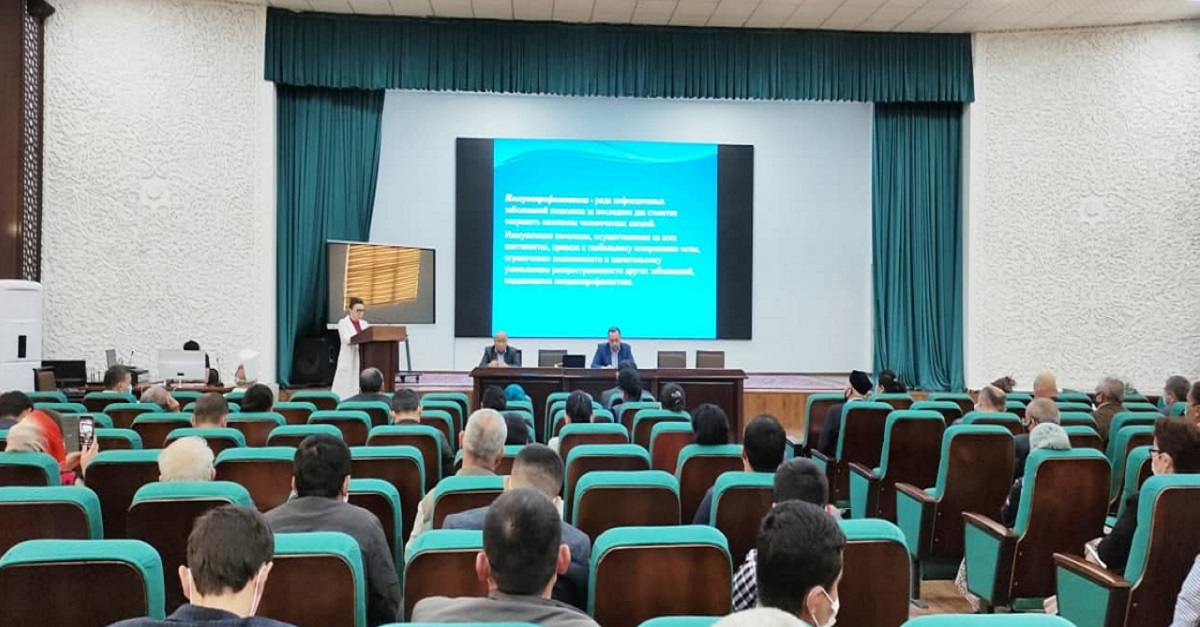Due to the fact that scientists are achieving effective results in treating and combating human diseases worldwide, medicine is advancing every day, making it possible to save the lives of millions of people from various infectious diseases through immunoprophylaxis.
Immunisation of populations on all continents has led to the global eradication of smallpox, a significant reduction in the prevalence of poliomyelitis and the incidence of other vaccine-preventable diseases.
The practice of vaccinating newborns and developing artificial immunity against disease enables immunoprophylaxis to also protect the health of millions of children from serious future problems.
At the meeting at SamSMI it was noted that a vaccine is a drug that develops immunity in the human organism against a specific pathogen. The widespread promotion of vaccination among children and medical restrictions on vaccinating citizens with diseases of the nervous system were put on the agenda during the meeting.
The meeting was attended by the Chief Specialist of the Ministry of Healthcare, Chairman of the Public Association of Paediatric Neurologists of Uzbekistan, Professor Shjanvar Shomurodovich Shomansurov and the Head of the Department of Neurology of Samarkand State Medical Institute, Professor Aziza Takhirovna Jurabekova.
Currently 40 infectious diseases are being effectively controlled by vaccines around the world, and that is not all. Immunoprophylaxis aims not only at eradicating a number of infections, but also at increasing the sensitivity of immunity to infectious diseases in the future.
In the observable future, new vaccines will be used in medical practice, which will save the lives of millions of people when they are massively spread.
In our country, 100% of children are vaccinated and, unlike in other countries, all vaccinations are free.
Today in our country children are being vaccinated against 13 types of infectious diseases and as a result they are fully protected against the following diseases
- poliomyelitis;
- diphtheria;
- measles (there is practically no post-challenge mortality);
- a steep decline in hepatitis B;
- infectious diseases after HIV (Haemophilus influenzae type B) and rotavirus infection;
- generalised tuberculosis;
- reduced mortality from pneumococcal infection;
- prevention of diseases caused by viral papillomatosis.
The above data confirm the fact that the use of occupational vaccines worldwide saves 2.5 million people a year from various diseases and deaths, which is equivalent to saving 5 lives a minute.
It has also been noted that the quality of the vaccination process, i.e. the safety of the product sought and the correct use of it, has a direct link with the local or general reaction of any child to it.
The reaction is the body's response to a particular pathogen, and before vaccination we must give our parents a proper understanding of how the process is carried out.
There are now certain requirements for vaccines:
- safety;
- absence of side-effects;
- immunogenic effect;
- formation of the "right" (necessary) type of immunity;
- relevant shelf life.
Vaccination as the backbone of public health has not lost its importance over the years, but the issue of the need for mass immunisation over the past 20 years has proved most pressing during the current pandemic.
The World Health Organization is also expanding its experience of mass immunization.
At the end of the meeting, speakers and participants discussed the work to be done on immunoprophylaxis in the country, as well as addressing the gaps and challenges related to the prevention of infectious diseases in our country.








